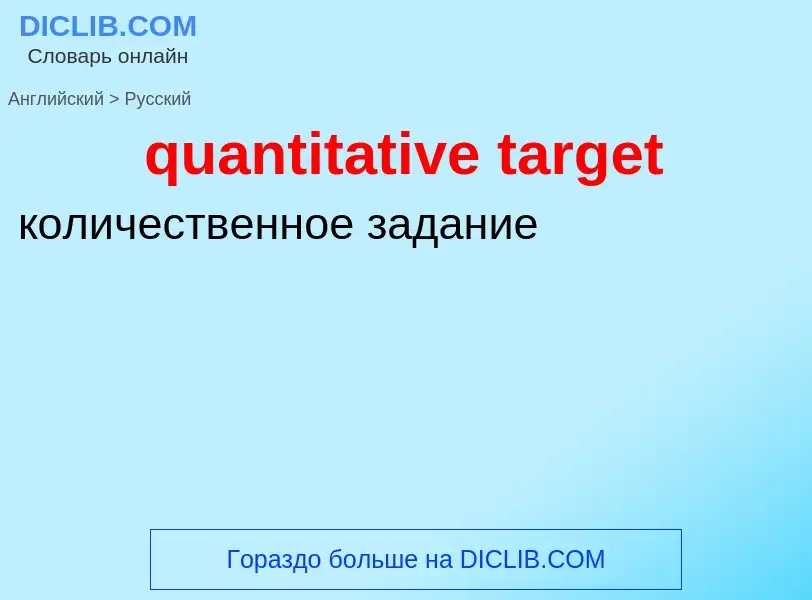Перевод и анализ слов искусственным интеллектом ChatGPT
На этой странице Вы можете получить подробный анализ слова или словосочетания, произведенный с помощью лучшей на сегодняшний день технологии искусственного интеллекта:
- как употребляется слово
- частота употребления
- используется оно чаще в устной или письменной речи
- варианты перевода слова
- примеры употребления (несколько фраз с переводом)
- этимология
quantitative target - перевод на русский
общая лексика
полигенная наследственность
общая лексика
полигенный признак
медицина
мультифакториальный признак
['tɑ:git]
общая лексика
мишень
клетка-мишень
прицельный (напр. о биопсии)
проверяемый (целевой) прибор, объект
исполнитель
целевое или управляемое устройство [при обмене данными] (подчиненное [внешнее] устройство-абонент интерфейса SCSI)
приёмник (данных) место назначения, адресат
область памяти, куда пересылается результат или где производится поиск
цель, план
выходной, объектный, целевой
бленкер
блинкер
мира
мишенный
мишень рентгеновской трубки
мозаика передающей телевизионной трубки
объект
цель
строительное дело
намерение
задача
задание
плановый показатель, контрольная цифра
визирная марка
нефтегазовая промышленность
план
мишень (шаровая пробка или глухой фланец на конце тройника для предохранения его от разъедания или размыва в точке, где выходящий из скважины поток меняет направление)
синоним
существительное
['tɑ:git]
общая лексика
мишень
цель
объект
мишень для уколов (фехтование)
поражаемое пространство (на теле противника - фехтование)
состязание в стрельбе
число выбитых очков
предмет (насмешек, критики и т. п.)
посмешище
задание
плановая или контрольная цифра
цель, мишень (перен.)
задание, контрольная цифра
плановый
физика
мишень для бомбардировки элементарными частицами
кулинария
отруб для жаркого
состоящий из шейной части и грудинки бараньей туши
геодезия
визирная марка
железнодорожное дело
сигнал (стрелки)
сигнал (стрелки)
электротехника
антикатод
указатель (сигнал или прибор)
вычислительная техника
выход
выходная информация (электронно-вычислительной машины)
синоним
глагол
общая лексика
делать кого-л. мишенью (насмешек, критики и т. п.)
намечать
планировать
железнодорожное дело
давать сигнал
военное дело
приводить к нормальному бою
пристреливать
2) намеченная цифра; плановая цифра; контрольная цифра
- by the target
- target for disposal of products
- beat the target
- exceed the target
- hit the target
- outstrip target
- overfulfill target
- smash target
- disaggregated target
- key target
- monetary targets
- money supply targets
- plan target
- planned targets
- profit target
- quantitative target
- sales target
- specific targets
Определение
Википедия
Quantitative research is a research strategy that focuses on quantifying the collection and analysis of data. It is formed from a deductive approach where emphasis is placed on the testing of theory, shaped by empiricist and positivist philosophies.
Associated with the natural, applied, formal, and social sciences this research strategy promotes the objective empirical investigation of observable phenomena to test and understand relationships. This is done through a range of quantifying methods and techniques, reflecting on its broad utilization as a research strategy across differing academic disciplines.
The objective of quantitative research is to develop and employ mathematical models, theories, and hypotheses pertaining to phenomena. The process of measurement is central to quantitative research because it provides the fundamental connection between empirical observation and mathematical expression of quantitative relationships.
Quantitative data is any data that is in numerical form such as statistics, percentages, etc. The researcher analyses the data with the help of statistics and hopes the numbers will yield an unbiased result that can be generalized to some larger population. Qualitative research, on the other hand, inquires deeply into specific experiences, with the intention of describing and exploring meaning through text, narrative, or visual-based data, by developing themes exclusive to that set of participants.
Quantitative research is widely used in psychology, economics, demography, sociology, marketing, community health, health & human development, gender studies, and political science; and less frequently in anthropology and history. Research in mathematical sciences, such as physics, is also "quantitative" by definition, though this use of the term differs in context. In the social sciences, the term relates to empirical methods originating in both philosophical positivism and the history of statistics, in contrast with qualitative research methods.
Qualitative research produces information only on the particular cases studied, and any more general conclusions are only hypotheses. Quantitative methods can be used to verify which of such hypotheses are true. A comprehensive analysis of 1274 articles published in the top two American sociology journals between 1935 and 2005 found that roughly two-thirds of these articles used quantitative method.

![A QTL for [[osteoporosis]] on the human chromosome 20 A QTL for [[osteoporosis]] on the human chromosome 20](https://commons.wikimedia.org/wiki/Special:FilePath/Example of QTL-Scan on a single Chromosom from PLoS Biology.jpg?width=200)
![Example of a genome-wide scan for QTL of [[osteoporosis]] Example of a genome-wide scan for QTL of [[osteoporosis]]](https://commons.wikimedia.org/wiki/Special:FilePath/Example of a Genome-wide QTL-Scan from PLoS Biology.jpg?width=200)
.jpg?width=200)
